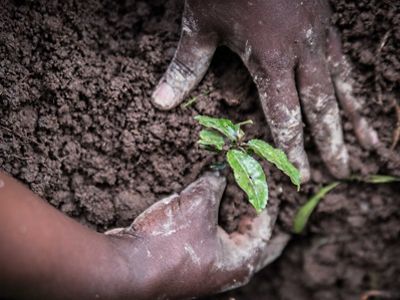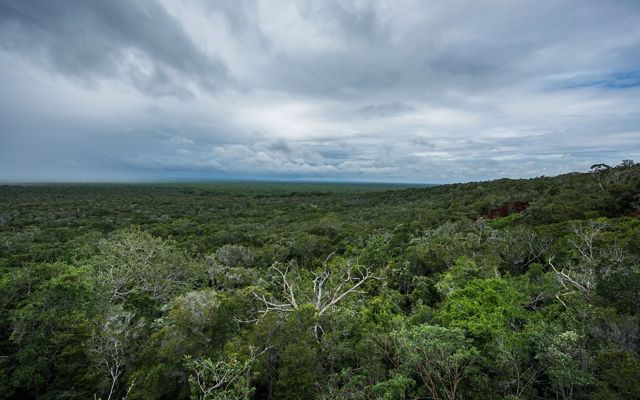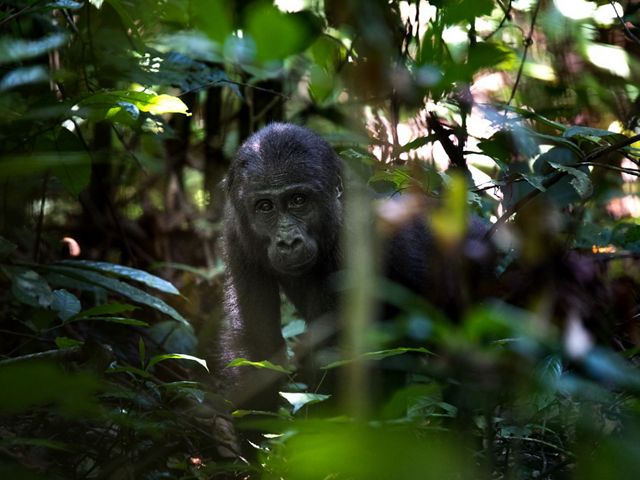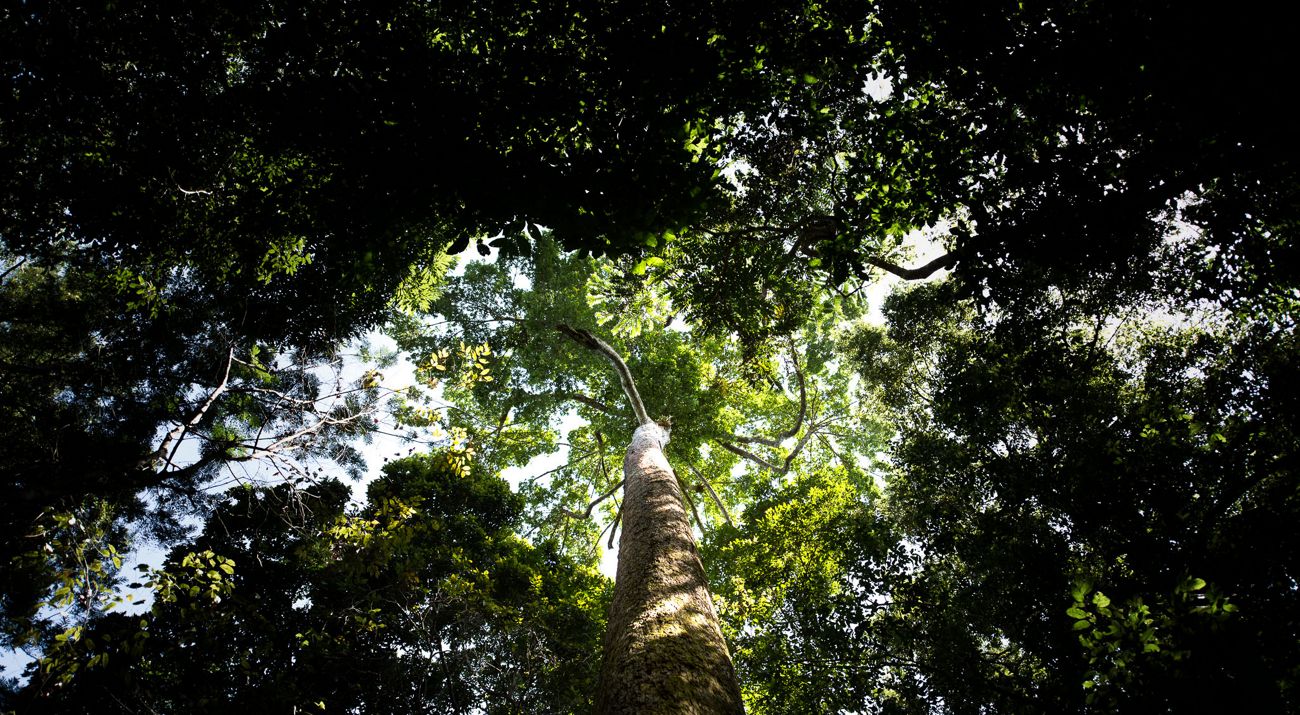The Key to Climate Action Hidden in Africa’s Forests
How a new business accelerator aims to scale up a critical natural climate solution
TNC recently announced a new initiative to accelerate natural climate solutions that protect and restore some of the planet’s most vulnerable forest in Africa. To help explain the potential of the Africa Forest Carbon Catalyst (AFCC), TNC Board of Directors and Africa Council member Edwin Macharia spoke with the two founders of the project—Kevin Juma and Edward Hewitt—about just how the AFCC will accelerate forest conservation and restoration on the continent.
Edwin Macharia: Thank you both for your time and your work. Let’s start with the topline question. What exactly is the Africa Forest Carbon Catalyst (AFCC)?
Edward Hewitt: The AFCC is a brand new TNC initiative inspired by the same kind of mechanisms that have helped launch many successful tech start-ups. Similar “accelerators,” or “incubators,” find promising projects with smart ideas and the potential to expand fast, and pair them with teams of experts to accelerate or catalyze their growth. The AFCC operates like those, and is the first such natural climate solution “accelerator” solely focused on Africa’s forests.
EM: Many may be unaware of the immense threats to forests in Africa. Can you explain why we need a mechanism like the AFCC to expand forest protection?
Kevin Juma: Quite simply, Africa has one-fifth of the planet’s remaining forests but is losing them faster than anywhere else. Protecting and restoring these forest landscapes is not only critical for Africa, but for the entire world. This forest protection model is among the most cost-effective natural defenses against climate change, in addition to helping maintain biodiversity, and providing economic opportunity for hundreds of thousands of people in the region.
Unfortunately, we have not seen nearly enough forest conservation and reforestation projects ready to absorb the significant private investment they need to achieve outcomes at scale. The AFCC focuses solely on that: finding projects or enterprises with the potential to have greater impact across a wider area, if they had a little extra support.


EM: I’m always curious to hear how innovative ideas emerge and take off in institutions. What sparked the the idea for the AFCC?
EH: Some years ago on behalf of TNC, I made a trip to East Africa as part of a scoping study looking at promising financially viable business models for forest restoration and conservation globally. I was struck by how many enterprises and entrepreneurs there were in East Africa and thought that their projects could achieve much greater scale and impact if equipped with a little more technical and financial assistance to remove some of the barriers they faced. I managed to persuade TNC and donors at the time that Africa was the place to focus, and made the move to Nairobi in 2018. Kevin joined soon after and since then we’ve been developing the idea and piloting different approaches together.
KJ: We’ve been piloting this idea by offering strategic grants and technical assistance to around six different enterprises in Kenya, Tanzania and Zambia. We’ve learned a lot during that time in terms of what works for the organizations we support and what works for TNC, and are now in a position to launch the product into the public domain and expand its reach.
EM: What is TNC projecting as potential outcomes of the AFCC?
EH: Africa is home to more than 20 percent of the world’s tropical forests and has the potential to deliver over 1 billion tons of CO2 emissions reductions annually through forest restoration and conservation pathways. The AFCC itself can’t achieve this alone—the important thing is to create tangible blueprints for projects that can be replicated at a meaningful scale.
Having said that, we do believe that the AFCC can achieve material results in its own right. Our models suggest that by 2025, AFCC projects could collectively avoid or reduce 20 million tons of CO2 emissions annually; restore or conserve 10 million hectares of African forest; improve 500,000 Africans’ livelihoods and wellbeing; and create 5,000 jobs in Africa.
The good news is we aren’t starting from scratch. The enterprises we support are already conserving more than 2 million hectares of land and verifying over 2 million tons of CO2 reductions annually. It’s now a question of how to scale up those existing efforts, as well as create a new wave of projects and enterprises able to follow in their wake.

EM: I love that this has the potential to scale across the continent. How does the AFCC actually work?
KJ: First we seek appropriate projects or enterprises to apply, or they approach the AFCC directly. Their work is then assessed to be sure it’s eligible, has potential, and can be scaled up. If so, then it becomes a project or enterprise in the Catalyst, receiving technical and financial guidance, as well as operational support as required.
It’s not a one-size-fits-all approach, and each organization we support has its own specific needs. For example, some may need a carbon feasibility study, some may need assistance with matching the right tree species with the right place, some may need to test out a new market, some may need help with business planning and “investor readiness.”
Once the AFCC has offered its support, the project or enterprise itself then sources financing. After that, as the project or enterprise grows, the AFCC monitors progress to show how its support together with the original idea or innovation has had wide conservation impact while giving attractive financial returns. This attracts more applications into the AFCC, building momentum as they succeed, and encouraging others in the sector to replicate the good ideas now being put into practice.
EM: What about smaller, more start-up organizations? How can the AFCC help those that aren’t already up and running with conservation actions?
EH: The AFCC has been set up to support organizations at three different stages of development. The first are established organizations that have already built out large-scale, successful operations but are looking to pivot into something new—One Acre Fund’s agroforestry initiative is a good example. The second are organizations that are scaling, such as Carbon Tanzania. These organizations have already demonstrated proof-of-concept success and are now ready to expand rapidly to achieve larger outcomes. The third are early stage start-ups, or even ideas without demonstrated success on the ground.
KJ: An example of this third group is an integrated landscape-scale restoration project we are supporting in Central Kenya. This involves a number of small, private-sector start-ups working together, as well as a partnership with county governments. AFCC’s role is twofold: First, to ensure there is a coordinated landscape-scale vision for the entire initiative (rather than a number of organizations all doing their own thing), and secondly, to help the early-stage organizations prove models and develop investable business plans. We can offer these organizations support to test and pilot new approaches without the fear of financial failure.
EM: Thank you both for your insights. I am encouraged by the AFCC model as an example of how TNC is combining innovative finance, its unique convening capabilities with local communities, and emerging science to build platforms that protect both people and nature.
To entrepreneurs in Africa, this is an opportunity to help shape humanity’s answer to one of the most pressing challenges of our time—climate change. So engage proactively.
If you have a potential project in need of upfront funding or technical assistance, are a donor interested in supporting this initiative, or are a technical or financial partner who could help this initiative scale, please email us at afcc@tnc.org.
Download the Catalyst Background Details (pdf) here.
Global Insights
Check out our latest thinking and real-world solutions to some of the most complex challenges facing people and the planet today.




